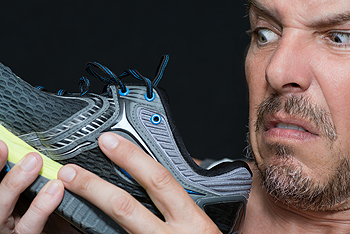
 Many people experience excessive sweating on the soles of their feet, and this is referred to as plantar hyperhidrosis. This condition may be a result of overactive sweat glands, and may be triggered by hot weather, eating spicy food, or exercising for extended periods of time. Additionally, there may be existing medical conditions which may contribute to causing this condition, including peripheral or spinal nerve damage, anxiety disorders, or obesity. There are several symptoms that may be noticeable in plantar hyperhidrosis, and these may include an unpleasant odor coming from the soles of the feet, athlete’s foot, or chronic blistering. There may be measures that can be taken to feel more comfortable, and this can be done by changing the shoes when they becomes damp, or replacing absorbent insoles frequently. If you are suffering from this foot condition, it is advised to speak to a podiatrist who can properly diagnose and treat plantar hyperhidrosis.
Many people experience excessive sweating on the soles of their feet, and this is referred to as plantar hyperhidrosis. This condition may be a result of overactive sweat glands, and may be triggered by hot weather, eating spicy food, or exercising for extended periods of time. Additionally, there may be existing medical conditions which may contribute to causing this condition, including peripheral or spinal nerve damage, anxiety disorders, or obesity. There are several symptoms that may be noticeable in plantar hyperhidrosis, and these may include an unpleasant odor coming from the soles of the feet, athlete’s foot, or chronic blistering. There may be measures that can be taken to feel more comfortable, and this can be done by changing the shoes when they becomes damp, or replacing absorbent insoles frequently. If you are suffering from this foot condition, it is advised to speak to a podiatrist who can properly diagnose and treat plantar hyperhidrosis.
If you are suffering from hyperhidrosis contact Dr. Edward D. Hutson of Easton, PA. . Our doctor can provide the care you need to attend to all of your foot and ankle needs.
Hyperhidrosis of the Feet
Hyperhidrosis is a rare disorder that can cause people to have excessive sweating of their feet. This can usually occur all on its own without rigorous activity involved. People who suffer from hyperhidrosis may also experience sweaty palms.
Although it is said that sweating is a healthy process meant to cool down the body temperature and to maintain a proper internal temperature, hyperhidrosis may prove to be a huge hindrance on a person’s everyday life.
Plantar hyperhidrosis is considered to be the main form of hyperhidrosis. Secondary hyperhidrosis can refer to sweating that occurs in areas other than the feet or hands and armpits. Often this may be a sign of it being related to another medical condition such as menopause, hyperthyroidism and even Parkinson’s disease.
In order to alleviate this condition, it is important to see your doctor so that they may prescribe the necessary medications so that you can begin to live a normal life again. If this is left untreated, it is said that it will persist throughout an individual’s life.
A last resort approach would be surgery, but it is best to speak with your doctor to find out what may be the best treatment for you.
If you have any questions please feel free to contact our offices located in Easton, and Northampton, PA . We offer the newest diagnostic and treatment technologies for all your foot and ankle needs.